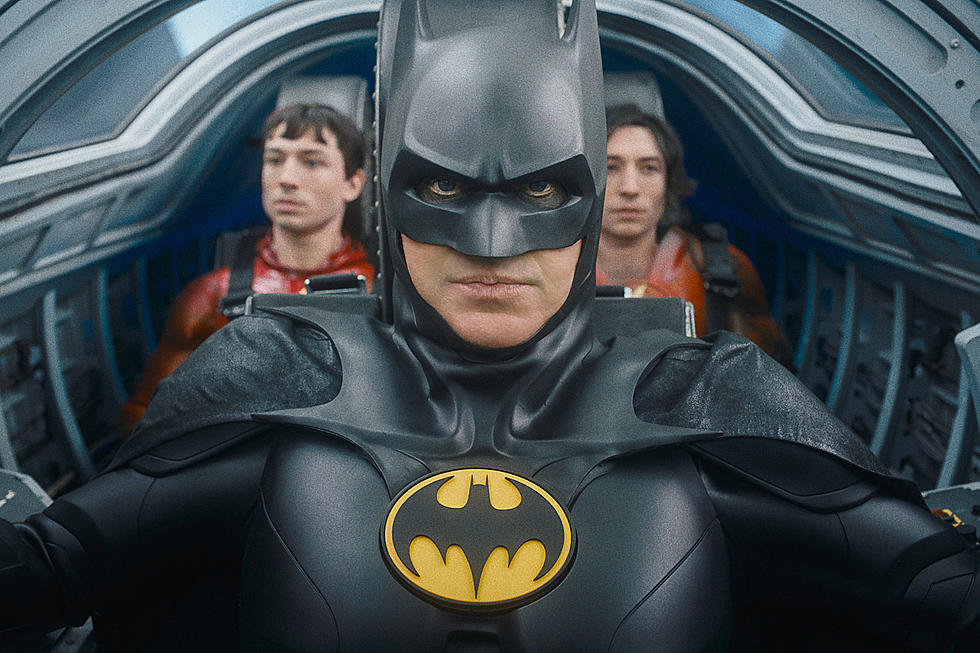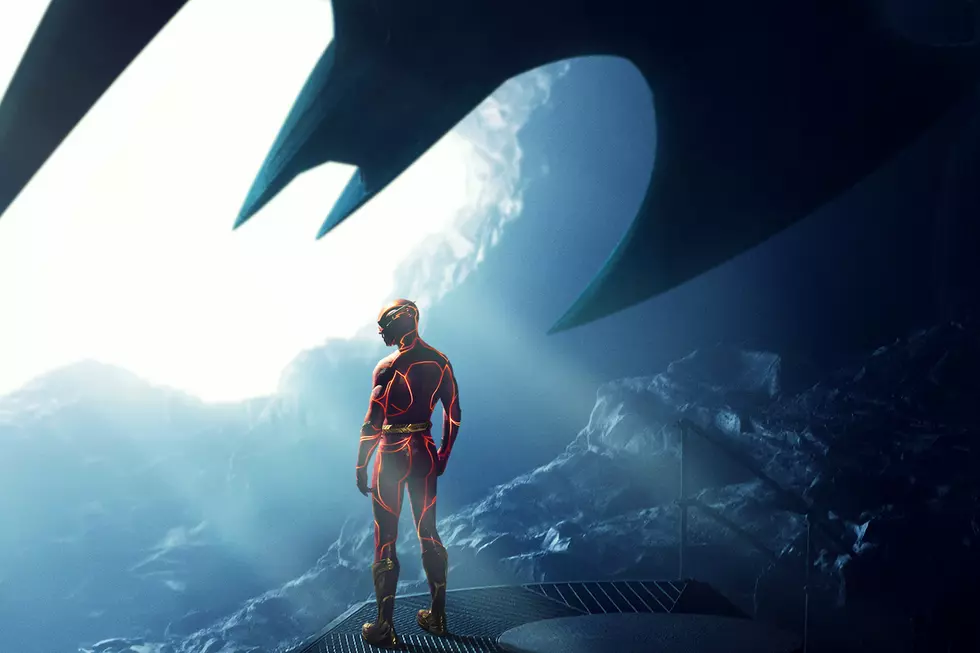
‘The Flash’ Review: Michael Keaton’s Batman Returns to Save This Movie
Michael Keaton was supposed to star in a third Batman movie in the 1990s. Even after Tim Burton was replaced by Joel Schumacher as the director of Batman Forever, Keaton remained attached to the project for months and months, until — at least according to internet legend — he grew dissatisfied with the script and turned down a $15 million paycheck to appear in the film.
It would not take many changes to history — the hiring of a different scriptwriter here, a slightly darker story there — to get Keaton to stick around for Batman Forever. Just imagine how different DC movies would look if that had happened. Keaton might have also returned for Batman & Robin, and destroyed his legacy as a great movie Batman by trading ice puns with Arnold Schwarzenegger. Or his continued involvement might have kept that movie closer in spirit to the Burton films, turning it into another popular hit. At that point, it’s plausible that Keaton hangs around for a few more Batman movies — which means Christopher Nolan never makes his Dark Knight trilogy. Which might mean Christopher Nolan’s entire career is changed, or maybe irreparably destroyed. All because Michael Keaton decided to hold his nose and play Batman for Joel Schumacher for $15 million.
It is fun to ponder these alternate paths through history, which is one reason multiverse movies have flourished in recent years. In our own universe, it took Keaton more than 30 years to play Batman again. And it’s not even in a full-fledged Batman movie: It’s in The Flash, which is less of a solo adventure for DC Comics’ fleet-footed hero and more of a soft reset of the entire DC Movie Universe featuring a veritable multiverse of guest stars. Ours may not be the darkest timeline, but it has to be one of the strangest.
READ MORE: Big-Name Actors Who Turned Down the Chance to Play DC Roles
Keaton’s improbable Batman return occurs as a side effect of the title character’s alteration to the “DC Extended Universe,” which began with Zack Snyder’s Man of Steel in 2013, and continued into Batman v Superman: Dawn of Justice, Aquaman, Wonder Woman, and two vastly different versions of Justice League. While helping his own universe’s Batman (Ben Affleck) save Gotham City, the Flash — AKA crime scene investigator Barry Allen (Ezra Miller) — discovers he has the ability to travel through time. And that gets Barry thinking.
When Barry was a boy, his mother (María Verdú) was killed and his father (Ron Livingston) was wrongfully sent to prison for her murder. Barry’s been unable to prove his father’s innocence in the present, but he realizes his time-travel powers might offer an even better solution: He could go back to the day of his mother’s death and stop it from happening in the first place. Barry is tempted to try, despite Batfleck’s warnings that changing the past could have unforeseen consequences in the present.
Sure enough, when Barry travels back in time to fix his family, he inadvertently breaks the world in the process. In the new present caused by Barry’s meddling, the evil Kryptonian warlord General Zod (Michael Shannon, reprising his role from Man of Steel) stands unopposed in his plan to conquer Earth, because this altered timeline has no Superman, Wonder Woman, or Aquaman to stop him. Ah, but it does have a Batman, or at least an older Bruce Wayne, played by Keaton, who lives like a hermit in stately Wayne Manor. Barry must convince this Batman to come out of retirement, help him stop Zod, and send him back to his own universe.
That’s about as succinct and as spoiler-free a plot synopsis as I can muster, but there’s a lot more stuff going on in The Flash. Once the multiverse angle goes into motion, the whole movie is plot, plot, plot, leavened with non-stop comic relief from Miller in a dual role as both the Flash, the brave superhero of Zack Snyder’s Justice League, and the significantly less mature Barry Allen of the alternate reality where the Flash gets trapped after he tries to save his mother’s life. The two Barrys — one super-fast, one not (unless you count his motormouth) — banter constantly, even amidst dire, end-of-the-world stakes.
A lot of the jokes, scripted by Christina Hodson (from a story credited to John Francis Daley, Jonathan Goldstein, and Joby Harold) are clever, as are the winking homages to the long history of DC movies and other famous cinematic time travel stories like Back to the Future. The Flash, directed by It’s Andy Muschietti, starts strong, with a lot of energy and humor, along with some lip service to the trauma unpinning so many superhero origin stories. (“These scars we have make us who we are ... don’t let your tragedy define you,” Affleck’s Batman cautions Barry as he begins to formulate a plan to save his mom.) You might not agree with Barry’s decision to meddle in the past, but you at least understand why he would try it.
Then the movie seems to lose sight of the character motivations underpinning its story, as it gets bogged down in Barry racing to fix all of his actions’ unintended side effects. And the movie is too busy from that point — now here’s two Barrys, now here’s Zod, now here’s the old Batman, now here’s a brand-new Supergirl (Sasha Calle) — to really reckon with any of its larger themes about fate and personal choice. There are so many twists and turns, and such a large cast, that even with two Barrys onscreen in a lot of scenes, the title character(s) and their motivations occasionally get lost.
Keaton still has that old Batman joie de vivre; even belatedly, it’s really fun to see him back in another adventure. (His future as the Dark Knight in projects like the now-canceled Batgirl film reportedly got altered by something even more powerful than time travel: Rewrites.) Miller does an impressive job making the two Barrys into distinct people; the illusion is so convincing that you sometimes forget that a lot of this movie is just one actor talking to themselves. The charisma of these stars, and the chemistry between them, keeps The Flash humming along at a nice clip.
But by the third act, all of the quipping and fan service begin to feel like a manic form of distraction; as if The Flash is trying to solve its overloaded story’s problems by outrunning them. That leads to a clunky and unsatisfying finale that combines some very misguided (and, I suspect for some audience members, deeply confusing) cameos with some truly ugly digital effects. The ending ties an emotional bow on Barry’s quest to repair his mental scars; it also completely undercuts its own message about wallowing in grief.
The good barely outweighs the bad here, at least enough for me to give The Flash a marginal recommendation. A lot of the reviews of The Flash from early screenings called it one of the greatest DC Comics movies ever made. Maybe in another universe that’s true. In this one, I thought it stumbled across the finish line.
Additional Rating:
-The Flash is practically an entire movie multiverse unto itself. If James Gunn hadn’t been hired to revamp the DC Universe during its post-production, if Ezra Miller hadn’t had all kinds of personal problems in the last few years, if any of the many writers and directors who tried developing the material — including Phil Lord and Chris Miller, Seth Grahame-Smith, Rick Famuyiwa, and even comic-book author Grant Morrison — had stuck with the project, it could have looked totally different.
-When The Flash ended, the gentleman sitting next to me turned to the person he’d come to the movie with and loudly declared that it was a better multiverse movie than Doctor Strange in the Multiverse of Madness. It was more “realistic,” he insisted, because “this is how this would actually happen.” I just felt I needed to share this analysis with someone.
RATING: 6/10

Actors Who Turned Down DC Roles
More From 92.9 The Lake










